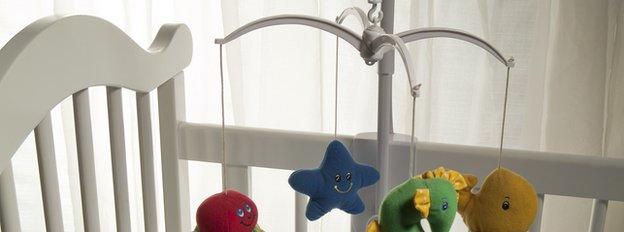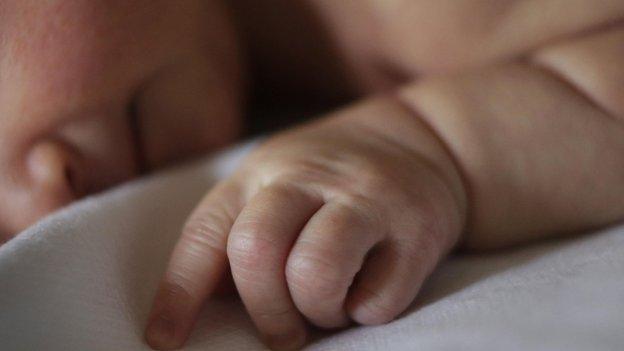'Huge rise' in newborn babies subject to care proceedings
- Published
Nicky Morgan MP: "The right decision for every child has to be made"
There has been a "huge" rise in the number of newborns who are subject to care proceedings in England, according to figures compiled for the first time.
Some 2,018 babies were involved in such cases in 2013, compared with 802 in 2008, the University of Lancaster said.
About half were taken from mothers with other children in care - one woman had 16 children removed - and a third were from women who became mothers as teens.
Education Secretary Nicky Morgan said the figures were "worrying".
Lead researcher Prof Karen Broadhurst said there had been "a general trend towards taking more timely action" where children could be at risk, but the number of newborns taken into care was "disproportionately increasing".
More studies were needed to determine the reasons for the rise, she said.
"That's a key question for me. In the absence of any analysis, any research, evidence, what more could we have done to prevent this huge increase?"

'It tore me apart'

Louise, who is in her early twenties, was sexually abused from the age of seven.
At 11 she ran away from home, and over the next five years, spent time in nearly 40 foster homes before going to live with a family member again.
Aged 18 she became pregnant and her son was born when she was 19.
"I started leaving him with other people because whenever he cried I just wanted to pick him up and shake him - and I shouldn't have been doing that as a mum, I should have been protecting him and looking after him - but I was going out and getting drunk.
"The social services got involved because I was involved with them as a child. I didn't have family support. I didn't have nobody. I asked them for help but obviously it resulted in me losing my child."
Shortly afterwards, she became pregnant again and was "over the moon" but she had her son taken away from her again by social workers.
"It tore me apart," she said. "I just kept crying and crying. Even now - it doesn't get any easier..."
Louise is now part of the Pause project in Doncaster, a scheme which helps women break the cycle of court proceedings and further pregnancies.
She said she was now planning to get a career and be more settled before having children again.

The figures, compiled for the first time using original family court records, showed a total of 13,248 babies were taken into care between 2007 and 2014 at birth or shortly after.
In 2008, of 672,809 live births in England recorded by the Office for National Statistics,, external 0.1% of babies entered the care system. The proportion had increased to 0.3% in 2013 - out of a total of 664,517 births.
Most babies would have been taken into care at hospital, the report said, and about 10% of those removed at birth will be returned to their mothers at the end of care proceedings.
Why are more newborn babies being taken into care?
Some may be looked after by other family members, while others may go into foster care or be placed for adoption.
Prof Broadhurst said: "Some mothers are caught in a destructive cycle: their child's taken into care, because of neglect or abuse, they quickly become pregnant again without changing their outlook or circumstances."
She added: "As you have more babies removed, the desire to replace the lost baby becomes stronger."
The Department for Education said it was aware of the problem and had given extra funding to projects such as Pause,, external and the family drug and alcohol court,, external which try to help women who have had successive children taken into care.

When can children be taken into care?
If a council has serious worries about a child, it can apply to the court for permission to take action to protect them.
Care proceedings can begin only once a child is born, but in some circumstances the local authority may begin assessing the situation while a woman is pregnant.
Children can be taken into care when they are suffering, or are likely to suffer, serious harm, for example:
When there is an ongoing, serious failure to meet a child's basic needs
Where there is concern that a child has been, or is likely to be, abused either by their parents or carers, or other people they know
Cafcass, an independent body which represents children, external in family court cases, will usually become involved to check the local authority's plans are in the child's best interests.

Claire Mason, report author, said it was ''vulnerable women'' who had their children taken into care
But Karen Goodman, from the British Association of Social Workers, said mothers whose children were removed often missed out on the drug and alcohol addiction treatment, mental health support and other care that could prevent them getting pregnant again.
She said the women "might not meet the eligibility criteria" for help at a time when budgets had been cut.
"You can't get away from the situation local authorities find themselves in," she told BBC Radio 4's Today programme.
'Cycle of failure'
"We do know that all the services are under a great financial strain and resources are an issue."
Education Secretary Nicky Morgan told the BBC more work was needed to prevent "a cycle of failure".
"Where children who have been in the care system, who have been let down, who haven't achieved well at school, for example, and who then often will not be able to provide that stable parenting for their own children...
"It is worrying, today's numbers, and it shows I think exactly why we're right to be focusing on this."
- Published23 June 2014
